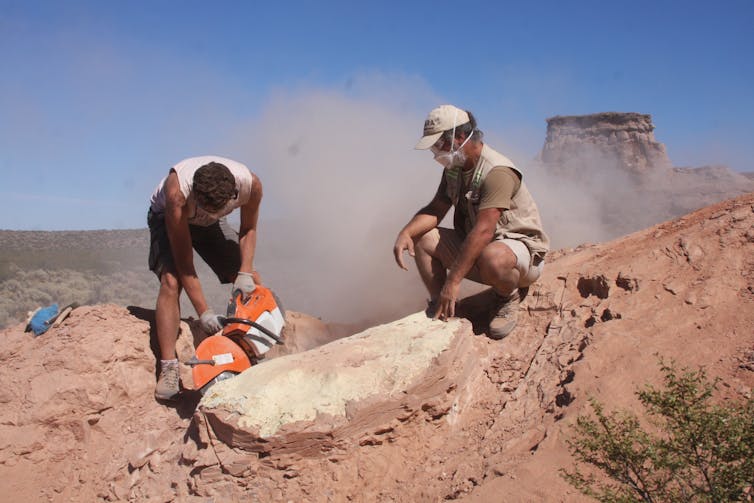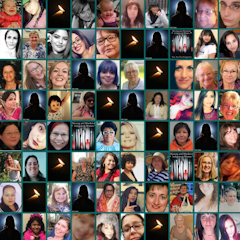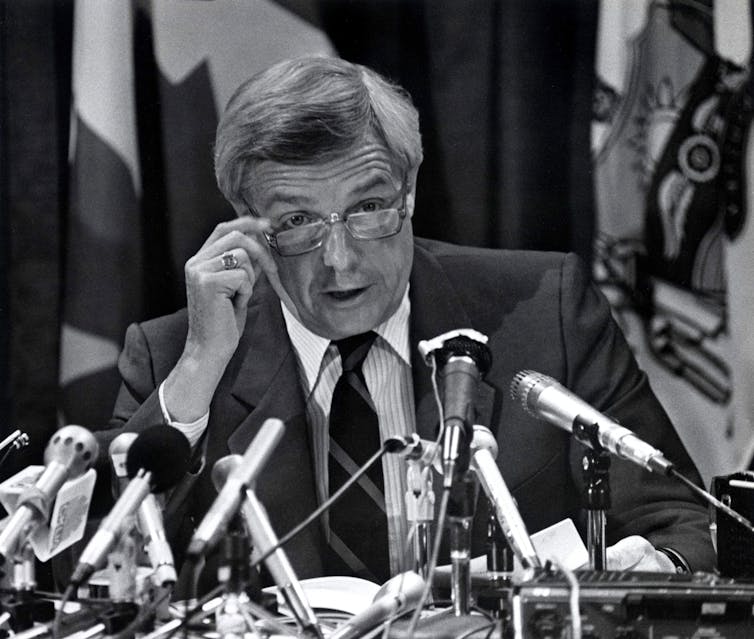Extraordinary skull fossil reveals secrets of
snake evolution
An artist rendition of the najash snake. Author provided
On very rare occasions, an exceptional fossil is unearthed that provides an extraordinary glimpse into the evolution of a group of organisms.
This time, it is the beautifully preserved skull of an ancient snake with rear limbs, Najash rionegrina. Our study of this fossil has been published in the journal Science Advances.
This and other new fossils help answer longstanding questions on the origins of snakes, such as how they lost their limbs and evolved their highly specialized skulls.
Fossil history
Najash rionegrina is named after the legged biblical snake Nahash (Hebrew for snake), and the Río Negro Province in Argentina, where the fossils were discovered. Fossils of Najash are about 95 million years old, and were first described in Nature from a fragmentary skull and partial body skeleton that preserved robust rear limbs.
This rear-limbed fossil snake garnered a great deal of media interest as it followed earlier reports of fossil marine snakes with rear limbs. What made Najash unique was that it was a terrestrial snake living in a desert, not an aquatic snake living in the ocean. In addition, the fossils were not compressed flat by the weight of overlying sediments, and so they were preserved in three dimensions, unlike the fossil marine snakes.
Read more: Did snakes evolve from ancient sea serpents?
Unfortunately, that first description of Najash relied on a very fragmentary skull. Scholars of snake evolution were left to guess at what the head of these ancient animals might have looked like.
We know from their shared anatomy that snakes evolved from lizards. We also know that the skulls of snakes have been key to their successful and highly specialized feeding adaptations. New Najash fossil skulls would be highly informative on the pattern of snake skull evolution.
The new discovery
It was a hot day in February of 2013 when Fernando Garberoglio, then an undergraduate palaeontology student from the Universidad de Buenos Aires, went on his first field trip to the La Buitrera Paleontological Area in northern Patagonia, Argentina. With him were two palaeontologists: Sebastián Apesteguía, from the Universidad Maimónides, and Guillermo Rougier, from the University of Louisville.
Looking for fossil vertebrates is an act of patient, painstaking discovery. It requires you to be close to the ground, scanning the grit, pebbles, rocks and sediments for a sign of bone. You must pick up each piece, inspect it closely, put it down and then repeat, hour after hour. At La Buitrera, you are scorched by the hot sun, pelted by driving rain and frozen by chilly Andean winds.
But it’s all worth it. Particularly when, as happened to Garberoglio, he finally picked up a pebble, only a few centimetres long, to find a small, ancient, bony face staring back at him.
“I found a snake skull!”

Rougier asked to inspect the fossil himself and found that, to his surprise, Garberoglio was right — there it was, an almost complete, 95 million year old, 3D preserved snake skull.
It has been 13 years since Najash was named, and seven years since Fernando’s discovery. Today, the long hunt has produced its reward of a treasure trove of new skulls and skeletons of Najash from the fossil rich sites at La Buitrera.
Skull evolution
A longstanding hypothesis is that snakes evolved from a blind, burrowing lizard ancestor. A group of small, worm-like, small-mouthed burrowing snakes, known as scolecophidians, have long been considered to be the most primitive living snakes.
The new Najash fossil material shows that the skulls of that lineage of ancient snakes were nothing like those of scolecophidian snakes. Instead, Najash and its kind had large mouths with sharp teeth and some of the mobile skull joints that are typical of most modern snakes. However, they still retained some bony skull features of more typical lizards.
In evolutionary terms, Najash tells us that snakes were evolving towards the skull mobility necessary to ingest fairly large prey items, a landmark feature of many modern snakes.
Scientific prediction
Critical information is also preserved in the bone-by-bone details preserved in these new fossils of Najash. For example, for a very long time, the rod-like bone located behind the eye of modern snakes — called the jugal — was thought to be the equivalent of the postorbital bone of their lizard ancestors. The idea followed that the jugal was absent in all snakes, fossil and modern.
The new skull of Najash demonstrates conclusively that this is not correct. The bone below the orbit in Najash has the same shape, position and connections as the L-shaped jugal of more typical lizards. This demonstrates that the lower bar of the jugal was lost through snake evolution, leaving behind a rod-like jugal in modern snakes. It is the postorbital bone that has been lost, not the jugal.

These new specimens of Najash are an excellent example of the predictive power of science. Hypotheses such as the presence of a jugal in snakes can be supported by the discovery of new data that fulfil those predictions. What happens as a result is that an old hypothesis is falsified and a new one is verified.
In short, the skull of Najash tells us that ancestral snakes were very similar to some of their close lizard relatives, such as big-bodied, big-headed lizards like Komodo dragons. This is a far cry indeed from the idea that snakes could have evolved from tiny, blind, worm-like, small-mouthed ancestors; no known fossils of ancient snakes resemble at all the supposedly primitive, small-mouthed scolecophidians.
Authors
 Michael CaldwellProfessor of Vertebrate Palaeontology, University of Alberta
Michael CaldwellProfessor of Vertebrate Palaeontology, University of Alberta- Michael Caldwell is affiliated with the University of Alberta, Departments of Biological Sciences and Earth and Atmospheric Sciences, and receives funding from Natural Sciences and Engineering Research Council of Canada (20 years of federal science funding), National Geographic Society (I have held three research and exploration grants), and internal research funds from the University of Alberta (as Chair of my department, I held 12 years of Chair Research Allowances awarded to me for exclusive use in my science research investigations - subject to the same expenditure rules as NSERC).
 Alessandro PalciResearch Associate in Evolutionary Biology, Flinders University Alessandro Palci is affiliated with Flinders University and the South Australian Museum.
Alessandro PalciResearch Associate in Evolutionary Biology, Flinders University Alessandro Palci is affiliated with Flinders University and the South Australian Museum.











